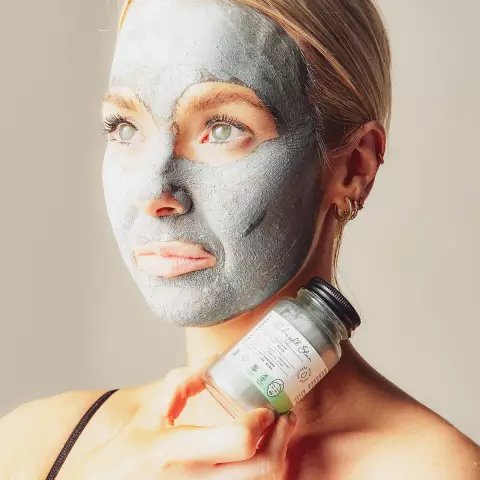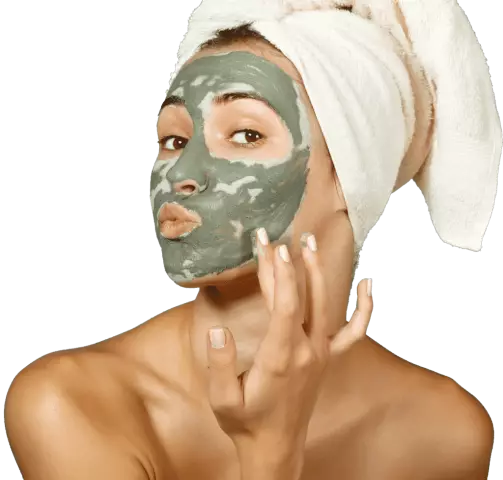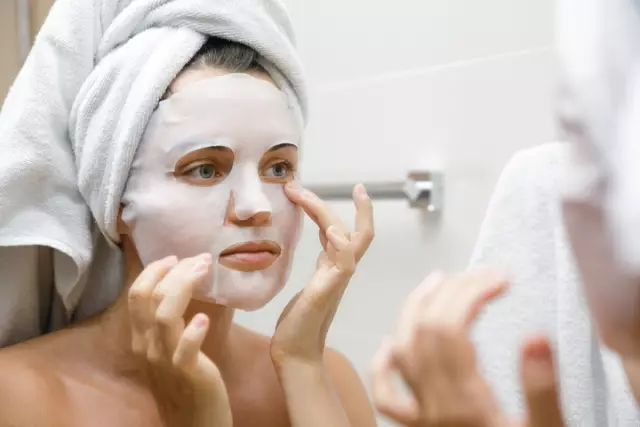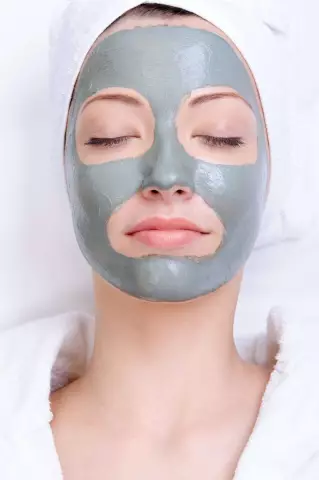- Author Rachel Wainwright wainwright@abchealthonline.com.
- Public 2023-12-15 07:39.
- Last modified 2025-11-02 20:14.
Clay face masks

Clay face masks are a type of cosmetic masks made from natural clay that does not cause allergic reactions. In modern cosmetology, they are widely used due to their low cost and excellent cleansing and whitening effect. Returning freshness and velvety to the skin, they can be used for all skin types.
Clay face masks provide additional cleansing and nutrition. So, their use is most effective when:
- Acne - from white, yellow and blue clay;
- For oily skin - from blue and white clay;
- Pigmentation - from blue clay;
- For sensitive skin - from red clay;
- Dry skin - from gray, green and red clay;
- Fading skin - from blue, white, green and red clay.
Properties of clay face masks
The main properties that clay face masks have are:
- Cleansing - elimination of already obsolete cells, as well as reduction of flaking, blemishes, redness and other skin defects;
- Drying - absorption of sweat secretions and excess sebum.
In addition, clay has always been considered an ideal skin whitening agent.
The effect of clay masks is largely due to the mineral composition, and the properties depend on the elements dominant in it:
- Silicon acts on blood vessels, making them more flexible, stimulates lipid metabolism, as well as the formation of bone tissue and collagen;
- Manganese has a deodorizing and drying effect;
- Aluminum has drying, antacid and astringent properties.
Principles of preparation and application of clay face masks
To prepare a clay face mask, dilute the clay with warm water to a creamy consistency. Instead of water, cosmetologists recommend using infusions of nettle, chamomile or flax seeds, which are saturated with phytohormones.
As a rule, it is enough to distribute one teaspoon of clay in order for it to be enough to apply a thick layer (2-4 mm) to the skin of the face. In this case, during application, the area of the eyes and lips should be avoided.
The duration of the procedure is 10-15 minutes, after which you should carefully wash off the mask and apply a nourishing moisturizer on your face.
To prevent the clay from drying out longer and not tightening the skin, put a plastic bag on top of the mask, which, sticking to the clay, will close the air.
Recipes for making clay face masks
Other ingredients can be added to clay masks depending on skin type.
For a combination skin type, clay is mixed with sour cream, milk, kefir or chamomile infusion in equal proportions. This mask not only soothes and cleanses the skin, but also nourishes it. Enhances the cleansing and anti-inflammatory effect of the mask with 1-2 drops of lavender or tea tree oil.
The following clay face masks are also suitable for combination skin:
- One tablespoon of white clay should be mixed with two tablespoons of grated apple or banana pulp and a tablespoon of sour cream or vegetable oil;
- Mix white clay and starch in equal proportions. Dilute the resulting mixture with milk to a creamy consistency.
For dry skin, you should not only choose the right kind of clay, but also mix it with any base oil, such as jojoba, olive, avocado, wheat germ, peach seeds. The oil softens the action of clay, nourishes and moisturizes the skin.
To enhance the whitening effect, one tablespoon of white clay should be diluted with juice from parsley leaves or cucumber, strawberry, strawberry juice until a thick mass is formed. Also, the whitening effect is enhanced by a few drops of lemon juice.
For problem skin with acne, one tablespoon of white clay is diluted with two tablespoons of vodka and one teaspoon of aloe juice.
For aging skin, white clay should be diluted in a tablespoon of milk, after which one teaspoon of honey should be added.
White clay face mask
White clay face masks are classified as drying masks. Cosmetologists recommend using them for oily and problem skin of the face, since white clay has the property of tightening pores, absorbing excess fat, and also has a whitening and anti-inflammatory effect.
Such masks improve the complexion, make it more defined oval and give a feeling of freshness.
Blue clay face mask
Blue clay face masks have anti-inflammatory properties.

The composition of blue clay contains many useful trace elements and mineral salts, which makes it possible to use it to smooth mimic wrinkles. In addition, the blue clay face mask:
- Activates the subcutaneous circulation;
- Has a healing effect on minor skin lesions;
- Effectively cleanses the skin from impurities;
- Improves complexion;
- Tones up the skin;
- Normalize metabolic processes in skin cells.
Green clay face mask
Green clay face masks have a pronounced cleansing effect. They are most often recommended by cosmetologists for dry skin. In addition, green clay tightens and smoothes the skin, making it elastic, and also restores the skin's hydrobalance.
Red clay face mask
Red clay face masks have a pronounced anti-aging effect.
For sensitive skin, a red clay mask is best suited as it relieves inflammation and soothes irritated skin.
Pink clay face mask
Pink clay face masks are suitable for nourishing and moisturizing normal skin types.
Yellow clay face mask
Yellow clay face masks are effective for skin inflammation and acne. In addition, they improve complexion and have a tonic effect.
Black clay face mask
Black clay face masks are recommended for deep cleansing.
Due to its rich mineral composition and physical properties, black clay acts on the skin like a scrub, removing dead cells and various kinds of impurities, deeply cleansing pores and removing harmful substances from the skin.
Gray clay face mask
Gray clay face masks effectively moisturize, enrich and nourish the skin. They are especially beneficial for dry skin.
Contraindications to the use of clay face masks
Since the masks contain a natural material - clay, there are no medical contraindications for the use of such masks.
Clay face masks practically do not cause allergic reactions. However, to maximize the effect of their use, you should consider:
- Masks should be applied only to skin that is free from any contamination;
- It is not recommended to apply a clay mask to the skin around the eyes.
Found a mistake in the text? Select it and press Ctrl + Enter.






